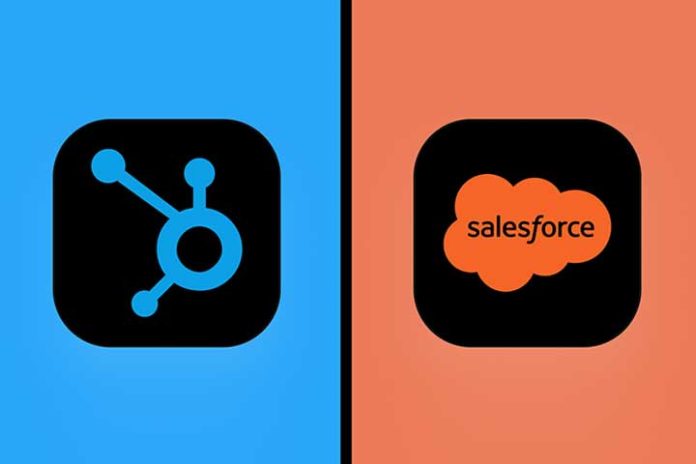Lately, we see many companies that are thinking about migrating platforms. Therefore, we put on the table what can lead a company to change its operations from Salesforce to HubSpot.
When choosing a technology to run our business, changing is not easy. What’s going on? Or what reasons are there usually for changing platforms?
As we all know, CRM and marketing automation solutions have undergone a great evolution thanks to the appearance of new platforms and technologies. Salesforce and Hubspot are two of the most popular platforms on the market, each with advantages and disadvantages. Would you like to analyze them with a specialist?
In recent years, we’ve seen an increase in companies migrating from Salesforce to HubSpot. And we have asked ourselves: What are the reasons behind this trend? What advantages does HubSpot offer over Salesforce? What pains do Salesforce users share?
Salesforce and Hubspot: a comparison
Salesforce is among the most popular CRM (Customer Relationship Management) platforms. She is known, above all, for her ability to personalize the customer experience and help sales teams work more efficiently. Salesforce has many features, from lead management to sales analytics, making it a powerful tool for businesses.
On the other hand, HubSpot was born as an inbound marketing platform that helps companies attract, engage and delight their customers. HubSpot, as you know, is known for its ease of use, short learning curve and optimization, and its focus on marketing automation and content management. Although HubSpot is best known for its marketing solutions, the platform offers various customer service, sales, and operations management tools. HubSpot also provides a number of tools for lead management and sales analytics, making it an attractive option for companies looking for an all-in-one solution.
Also Read: Audiences In Google Ads: Remarketing And Prospecting
What are the usual ‘pains’ of companies that operate with Salesforce?
After several years doing integrations and migrations between HubSpot and Salesforce, we have made a list of ‘pains’ or ‘improvement points’ that companies and teams that use Salesforce usually have. Do they look familiar?
Image salesforce
Complicated to use – As mentioned above, Salesforce can be complicated, especially for those unfamiliar with the platform. Many people tell us that they know that they are not using the potential of the platform and that they do not include in their strategies and actions the technological capacity that Salesforce possesses because they do not know how to implement it or to do it takes too much time, money and effort. Customization and configuration of Salesforce may require technical knowledge and programming experience.
Expensive
Salesforce can be expensive, especially if additional integrations are required. Another advantage of HubSpot is that companies can choose between different plans and packages, which allows them to customize their experience according to their needs and budget. Depending on your growth, investment capacity, and needs, you can improve and add functionalities (license upgrades). In addition, HubSpot has a market for native applications, pluggable tools, and apps that often cost nothing or are usually quite low and easy to do.
Customization issues
Salesforce can be less flexible in terms of customization than HubSpot, which can be a problem for some businesses. Companies need more agility in implementation (IT teams and operations are saturated with incidents and a queue of technical tasks to improve or solve). In addition, marketing, service, or sales teams need different things and evolve at different rates, so personalization is key for them. In addition, Hubspot offers a large variety of templates and design resources. What makes creating content easier and faster thanks to the CMS Hub or the resources available for implementing sales or marketing actions, mainly.
Integration
HubSpot offers an integrated platform that allows businesses to manage their marketing, sales, and service tools in one place. What HubSpot customers highlight as an advantage is that they can easily integrate their platform with other third-party tools and applications, such as third-party CRMs, Google Analytics, and third-party marketing automation platforms. In addition, Hubspot has many native integrations with popular apps and tools, such as Slack, SurveyMonkey, and WhatsApp. Salesforce also offers integrations but may require more time and resources to implement.
Automation
HubSpot offers a wide range of marketing automation tools, allowing businesses to save time and increase efficiency. Hubspot’s automation tools include workflow creation, audience segmentation, and content personalization. Salesforce also offers automation tools, which may require more setup and customization.
Customer Support
Hubspot offers live, online customer support and a wide variety of learning resources on HubSpot Academy. HubSpot customers can access an online community of users, user guides, and tutorials. Salesforce also offers customer support, but it can be more difficult to access and less comprehensive than HubSpot’s.
What are the advantages companies often find using HubSpot over those using Salesforce?
Ease of Use
One of the main advantages of HubSpot is its ease of use. The interface is intuitive and easy to use, meaning sales and marketing teams can get up and running quickly, in many cases, without needing specialized technical support from the IT team. On the other hand, Salesforce can be tricky for those unfamiliar with the platform.
All-in-one
HubSpot is an all-in-one platform that offers tools for marketing automation, lead management, customer service, operations management, automation, proprietary CMS connected to CRM, and sales, marketing, or analytics. Service. On the other hand, Salesforce may require integrating various tools to achieve the same goals.
Marketing and sales integration
HubSpot is known for integrating marketing and sales into a single platform. This means the marketing and sales teams can work together more efficiently and effectively. Salesforce, on the other hand, can be seen as a more sales-focused tool.
Pricing
HubSpot offers a variety of pricing plans, making it more accessible to businesses of different sizes and budgets. Salesforce, on the other hand, can be expensive, especially if additional integrations are required. Also, maintaining and updating Salesforce often requires more investment than HubSpot.
Also Read: Five Advantages Of Process Automation For Your Business

